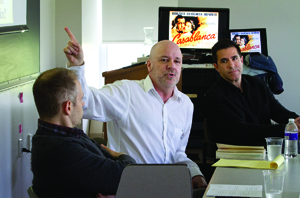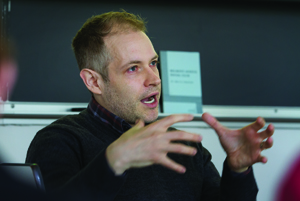Film Study Helps Make Theory Tangible

Screenwriter and playwright Bruce Graham (center) shares details about the making of Casablanca as Ben Berger (right) and Joe Gangemi (left) listen. Photos by Laurence Kesterson.
In his Political Theory class, Ben Berger, associate professor of political science, likes to illuminate the themes of philosophical texts by pairing them with five modern films. Movies, he believes, are a familiar art form that can provide comfortable entry points to complex philosophical discussion.
This spring, Berger further enriched his course by enlisting Philadelphia-area screenwriters, including Joe Gangemi ’92 and Bruce Graham. Support for this effort came from a grant from The Andrew W. Mellon Foundation, which enables Swarthmore, Haverford, and Bryn Mawr professors to enhance their scholarly offerings through collaborations with artists. The grant is providing $60,000 a year for three years for Swarthmore-initiated creative residencies.
Other Mellon residencies this past year included an exhibition, lectures, and discussion with a photographer in the interdisciplinary environmental studies program; and a collaboration between a choreographer/mathematician and faculty and students from Swarthmore’s and Bryn Mawr’s departments of mathematics, dance, linguistics, and education.

Of the class in which he participated this spring, Joe Gangemi ’92 says, “We were looking at the film as a text, but it’s a text that was using a different set of tools than a printed text would.”
One featured movie in Berger’s course was Casablanca, a vehicle for examining whether patriotism is a virtue or a vice. References to political philosophers Michael Sandel, Martha Nussbaum, and Aristotle underpinned lively classroom debate about the moral evolution of Rick Blaine, the Humphrey Bogart character, as a neutral “citizen of the world.” In another class, the movie Scarface was the focus. It features a running motif of garish painted sunsets; the presence of only one genuine sunset in the film led to a discussion of losing one’s way in false aspirational images and Plato’s views on authenticity.
Berger and Gangemi assert that films enhance students’ understanding of course material, because the narrative form has the power to engage the viewer emotionally first rather than intellectually. Discussion of philosophical principles illustrated through movies encouraged the students to speak their minds and make their own connections, underscoring the idea that there is no one correct answer.
Berger believes his class demonstrated that even a small supplementary budget, using local artists, can have a big effect in the classroom. He also noted that simply knowing this funding is available can inspire professors to think more creatively about their course material.
For his part, Gangemi loved the way the course sharpened his own thinking after two decades of screenwriting in Hollywood, including the 2007 movie Wind Chill with actress Emily Blunt and the forthcoming Eliza Graves with Kate Beckinsale, Michael Caine, and Ben Kingsley. The Mellon grant enabled him to complete some long-postponed reading in political philosophy. In short, he says, “It was spectacularly fun!”
 Email This Page
Email This Page